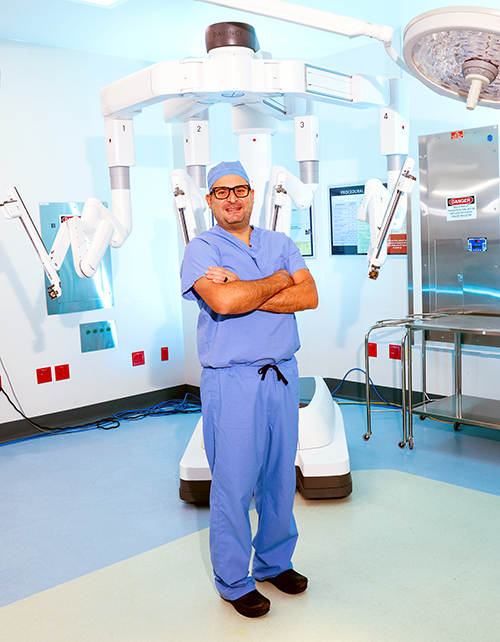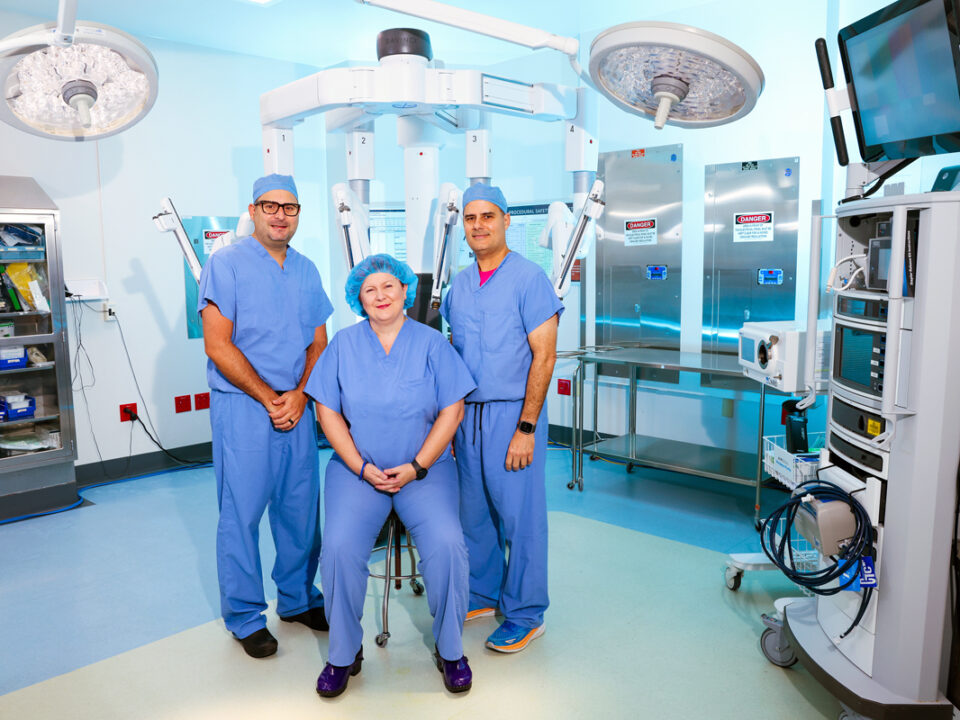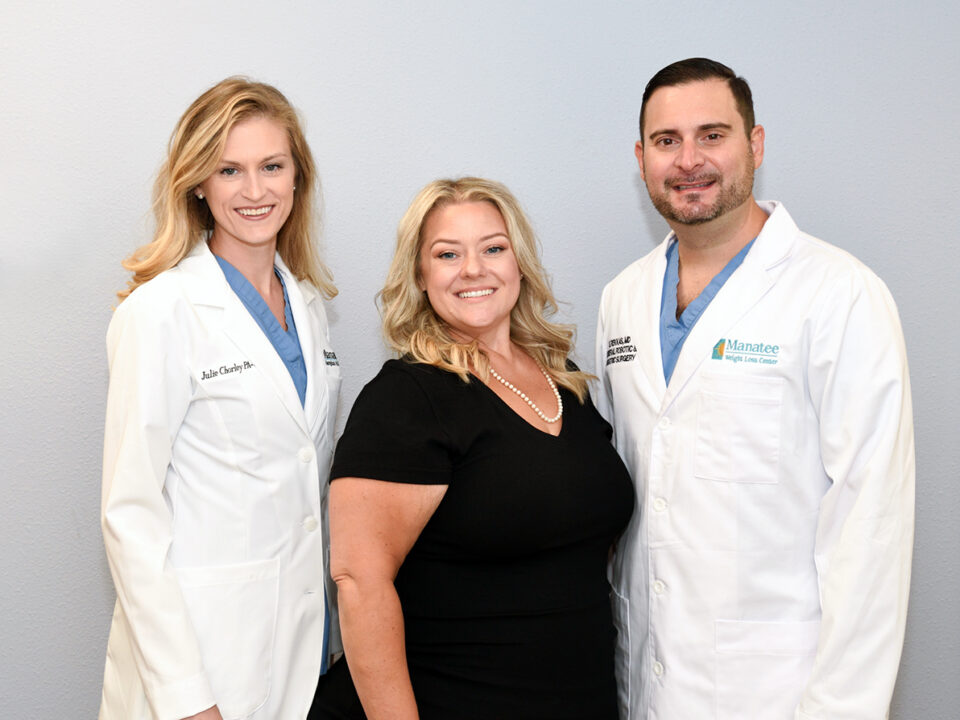

CAPTION: COURTESY PHOTO MANATEE MEMORIAL HOSPITAL
Dr. Stelios Rekkas is the medical director of the bariatric program at Manatee Memorial Hospital, where he specializes in robotic surgery.
Between 1975 and 2016, the prevalence of obesity across the world tripled. But nowhere did its prevalence expand more than in the United States, where the Centers for Disease Control and Preventions estimates that 41.9 percent of all people are now obese. Obesity is a disease that can lead to other health conditions such as heart disease, stroke, Type 2 diabetes, and certain types of cancer, but it can be corrected, and Manatee Memorial Hospital has dedicated itself to leading those efforts. Florida Health Care News recently sat down with Stelios Rekkas, MD, FACS, FASMBS, the medical director of the bariatric program at Manatee Memorial Hospital, to discuss those efforts and the robotic weight-loss surgical procedures he specializes in.
Q: Before we dig into your work with Manatee Memorial Hospital, let’s delve into your background a bit. What inspired you to get into medicine?
A: I grew up in Anna Maria Island, and early on, I knew I wanted to be a surgeon because I like using my hands, and I liked the idea of helping people. It made me feel good to watch them get better and healthier, so that was a driving force.
Q: You are a general surgeon, but bariatric and robotic surgery are your specialties, correct?
A: Yes, I am a general surgeon. I do gallbladder surgery, colon surgery, acid reflux surgery and surgery for inguinal hernias and ventral hernias. I also did a fellowship in minimally invasive surgery, robotic surgery and weight-loss surgery, and since then, I have focused more on the weight-loss surgery because there’s a dramatic transformation associated with someone losing 100, 200 or 300 pounds, and it’s very gratifying to play a role in that. These patients are usually people who have struggled and tried everything to lose weight and just need a little encouragement to help them get to where they want to be.
Q: What are the different kinds of weight-loss surgery, and what makes someone a candidate for them?
A: There are two main kinds of weight-loss surgery right now, and they’re both done robotically. The first is a gastric bypass surgery, but by far the most commonly performed worldwide is the sleeve gastrectomy surgery. More than 70 percent of our patients have sleeve gastrectomies, and to be a candidate for these, you need to be about 100 pounds overweight. There’s also a formula we use called the BMI, or body mass index. On average, people need to have a BMI above 40 or a BMI above 35 with medical issues like high blood pressure, diabetes, sleep apnea, arthritis, hypertension and hyperlipidemia to qualify for these procedures.
Q: Take us through the sleeve gastrectomy procedure?
A: During the gastric sleeve or vertical sleeve gastrectomy, we only operate on the stomach, and at Manatee Memorial Hospital we do this surgery with an amazing tool called the da Vinci Xi® Surgical System, a surgical robot. With the help of this robot, we remove 80 percent of the stomach, and with most patients, we’re done with the procedure in less than an hour. After that, the patient typically spends one day in the hospital, and most patients are back working in five to seven days. What the surgery does is change their ability to store food. As a result, people eat smaller quantities. They tend to get full very fast because they can only eat about 20 percent of what they used to be able to eat. The other thing we see with this surgery is a hormonal change. There’s a hormone called ghrelin; it’s a hunger hormone that drives patients to eat and have cravings, but after the surgery their stomach is smaller, so they get full with smaller meals and don’t have the same cravings because of that hormone change.
Q: Take us through the gastric bypass procedure.
A: The gastric bypass is a much bigger surgery. It involves cutting the stomach and making it about the size of a golf ball. At the same time, we also move the intestines around, so that procedure has a slightly higher complication rate. You do have maybe a little bit more weight loss with the gastric bypass, but the risk of complications is greater than that of the gastric sleeve gastrectomy.
Q: You mentioned something about cravings. Is it just natural that if the stomach is smaller cravings are reduced?
A: That’s part of it. The stomach has receptors in it that tell the brain when it’s full. Think of it as if your stomach is your gas tank. If I take your gas tank and decrease it by 80 percent, the stomach fills up faster and so it’s telling the brain, I’m full. I can’t do anymore. The other part has to do with the hormones that are made in the stomach, the hunger hormone. There are cells that make this hormone in that part of the stomach, and when we remove it, that hormone goes down by approximately 95 percent. Not only do people get full faster, but they don’t have the same drive initially to eat. They’re not run by their cravings anymore. They eat because they want to give themselves nutrition and vitamins, but it doesn’t drive them as much anymore.
Q: On average, how much weight does someone lose after one of these surgeries, and how soon do they lose the weight?
A: The results are pretty consistent. Most people lose about 80 percent of the extra weight they have and reach their healthy goal weight about a year after having the surgery. It all depends on what they put into it, but the success rates of these surgeries is about 85 to 90 percent. That’s compared to only about 5 percent of people succeeding in reaching their weight goal through a diet and exercise program or any diet pill they may take.
Q: Are there diet restrictions associated with these surgeries?
A: For about two months after surgery, patients will be on a very special diet that starts with clear liquids and slowly transitions into soft foods. Then, after about two months, they’re eating normal food. We also strongly encourage a lifestyle change that includes a proper diet and exercise. Following surgery, we see our patients one week later, then two, three, six, nine and 12 months after surgery and annually after that to make sure they continue to do well.


CAPTION: COURTESY PHOTO MANATEE MEMORIAL HOSPITAL
Dr. Stelios Rekkas
Q: How does the surgical robot help you and the patient?
A: The robotic system is an amazing surgical tool. It allows the surgeon to operate more precisely, and I want to emphasize that I control everything the robot does while sitting at a console where I have a magnified three-dimensional view of the surgical area. The difference is like threading a needle with your eyes and threading a needle with a microscope. With this robot, we cause less damage because we’re working through very small incisions that are only about 8 millimeters in size. That allows for less damage and less postoperative pain for the patient.
Q: I’m sure you appreciate the fact that Manatee Memorial Hospital has made such a strong commitment to this advanced technology?
A: Very much so. These machines are a big investment. But it’s hard to put a price on getting people healthier, preventing complications, decreasing hospital stays and getting people back to work.
Q: Let’s talk about some of your successes.
A: We are consistently changing people’s lives through these surgeries, but one that stands out was a diabetic patient who had high blood pressure, was on 10 different medications and could not walk up a flight of stairs. After surgery and a loss of 215 pounds, the patient’s life was changed. The patient wanted to be able to get on an airplane and wear a regular seat belt and not feel ashamed. And now, not are they able to do that, but the patient can walk around amusement parks and play with their kids and grandkids, who are now trying to keep up. Just imagine walking around with an extra 200 pounds on your back and someone comes along and just gets rid of it for you. That’s why I say that these are life-changing procedures that are helping to cure or at least decrease the risk of other conditions.
Q: Thanks for spending some time with us, Dr. Rekkas. Where can people find you and your practice?
A: My practice is right across the street from Manatee Memorial Hospital at 232 Manatee Ave. E., and they can look me up online at manateephysicianalliance.com.
Individual results may vary. There are risks associated with any surgical procedure. Talk with your doctor about these risks to find out if bariatric surgery is right for you. Physicians are on the medical staff of Manatee Memorial Hospital, but, with limited exceptions, are independent practitioners who are not employees or agents of Manatee Memorial Hospital. The hospital shall not be liable for actions or treatments provided by physicians. For language assistance, disability accommodations and the nondiscrimination notice, visit the hospital’s website.











I need your information to make an appointment.
I’ve been trying to do the surgery with a Dr. located in Orlando, FL , but they don’t accept my insurance.
I qualify for this a 100% thru my all medical conditions.
Katty Fernandez
407-516-1263
kattyfernandez@hotmail.com